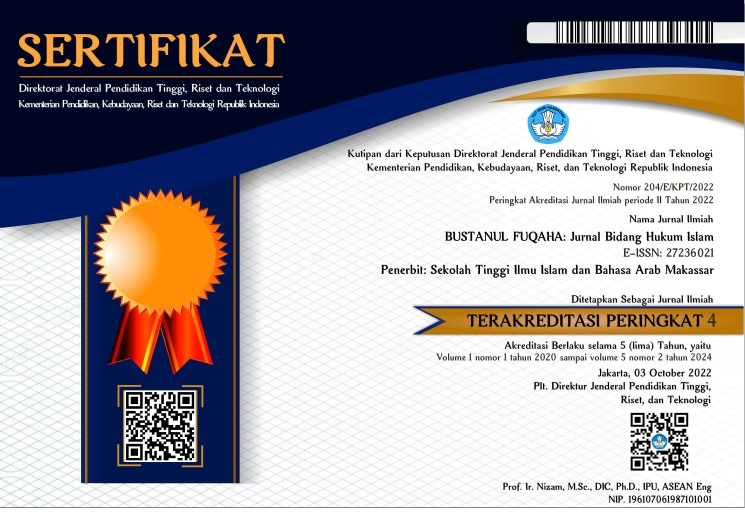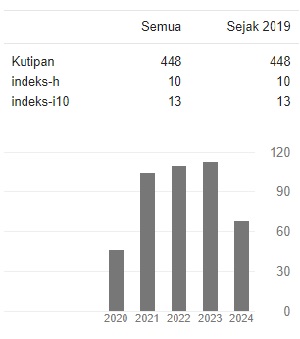Implementasi Kaidah “Lā Masāga li al-Ijtihād fī Maurid al-Naṣ” dalam Fikih Islam
Implementation of Rule “Lā Masāga li al-Iljtihād fī Maurid al-Naṣ” in Islamic Law
DOI:
https://doi.org/10.36701/bustanul.v2i1.293Keywords:
Ijtihad, Islamic rule, Islamic Fiq, Nash.Abstract
The purpose of this research is to describe, explain the meaning and veracity of the rules Lā Masāga Lilijtihād Fī Maurid al-Naṣ, and to explain how the implementation of the rules Lā Masāga Lilijtihād Fī Maurid al-Naṣ. This research is qualitative, the type of research is library research and uses a normative juridical approach. The data collection method used was a literature study. The results showed that; 1) 1. The rule Lā Masāga Lilijtihād Fī Maurid al-Naṣ has the meaning that it is not permissible to do ijtihad as long as there is a verse. And the function of fiqh rules, especially in this jurisprudence principle, is to explain that the law of fiqh functions to provide an interpretation of the text that it is not permissible to do ijtihad or seek the law of a problem as long as the problem is still explained in the law in the text. 2) The validity of the rules of Lā Masāga Lilijtihād Fī Maurid al-Naṣ is listed in the passages of the Koran and as-Sunnah, which explains about prioritizing the commands of Allah and His Messenger before taking other laws if there is no explanation in the Shari'a. 3) The implementation of the rules of Lā Masāga Lilijtihād Fī Maurid al-Naṣ (ijtihad is not allowed as long as nash is existing) is valid as long as it does not violate or contradict the nas, consensus, qiyas jaliy, the words of the 4 mazhab, and the judge's error in the legal outcome, cause, or method. So the implementation of this rule can be noticed in existing examples and this rule cannot always be implemented or implemented, because several things have been mentioned regarding the exceptions regarding this rule.
Downloads
References
Ali, Mohammad Daud. Hukum Islam; Pengantar Ilmu Hukum dan Tata Hukum Islam di Indonesia. Cet. 21; Jakarta: PT RajaGrafindo Persada. 2015.
Al-Būrnū, Muḥammad Ṣidqī bin Aḥmad bin Muḥammad. al-Wajīz fī Īḍāḥ al-Fiqh al-Kulliyyah. Cet. 5; Beirut: Muassasah ar-Risālah, 2002M/1422H.
Al-Dāruquṭnī, 'Alī ibn Umar. Sunan al-Dāruquṭnī, Jilid I. Beirut: Dār al-Fikr, 2001.
Al-Dūsarī, Muslim bin Muḥammad bin Mājid. al-Mumti’ fī al-Qawā’id al-Fiqhiyyah. Cet. I; Riyāḍ: Dār Zidnī, 2007M/1428H.
Al-Sijtānī, Abu Dāwud Sulaīmān bin al-Asy’aṡal-Azdī. Sunān Abī Dāwud. Cet. 2; Damaskus: Dār al-Risālah al-‘Ilmiyyah. 2009 M/1430 H.
Al-Suyuṭī, Abdurraḥmān. al-Asybah wa al-Naẓāir. Cet. I; Beirut: Dār al-Kutub al-‘Ilmiyyah. 1983 M/1403 H.
Al-Zarqā, Aḥmad bin Muḥammad. Syarḥ al-Qawā’id al-Fiqhiyyah. Cet. 2; Damaskus: Dār al-Qalam. 1989 M/1409 H.
Hamzawi, ‘Adib. Qawaid Ushuliah & Qawaid Fiqhiyah (Melacak Konstruksi Metodologi Istinbath al-Ahkam). INOVATIF: Jurnal Penelitian Pendidikan, Agama dan Kebudayaan 2 No. 2 (2016) : 91-111.
Ibrahim, Duski. AL-QAWA’ID AL-FIQHIYYAH. KAIDAH-KAIDAH FIKIH. Cet. I; Palembang: Noerfikri. 2019.
Ibrāhīm Madkūr, dkk., Mu’jam al-Wasīṭ Cet: 4. Kairo: al-Maktabah al-Syurūq al-Dauliyyah), 2004M/1425H.
Kamus Besar Bahasa Indonesia Dalam Jaringan. Last access November 14, 2020. https://kbbi.kemdikbud.go.id
Kementerian Agama Republik Indonesia. Mushaf al-Qur’an dan Terjemah. Depok-Jakarta: al-Huda Kelompok Gema Insani, 2002.
Khallāf, ‘Abdul Wahhāb. ‘Ilmu Uṣul al-Fiqh Cet. 8. Kuwait: Dār al-Qālam. t.th
Manẓūr, Ibnu. Lisān al-‘Arab. Jilid 5. Kairo: Dār al-Ma’ārif, t.th
Mubarok, Jaih. Kaidah Fikih; Sejarah dan Kaidah Asasi. Jakarta: Raja Grafindo. 2002
Shalih, Muhammad Adib. Tafsir al-Nushush fi al-Fiqh al-Islami. Bairut: alMaktabah al-Islami, 1984.
Sudhanan, Lukmanul Hakim dan Muhammad Yusram, Kaidah dalam Interaksi dan Interpretasi terhadap Nas-nas Tanda Hari Kiamat.” NUKHBATUL'ULUM: Jurnal Bidang Kajian Islam 5 No. 2 (2019), 64-87.
Yahya, Mukhtar and Fatchur Rahman. Dasar-Dasar Pembinaan Fiqh Islam.
Bandung: Alma’arif, 1986.














